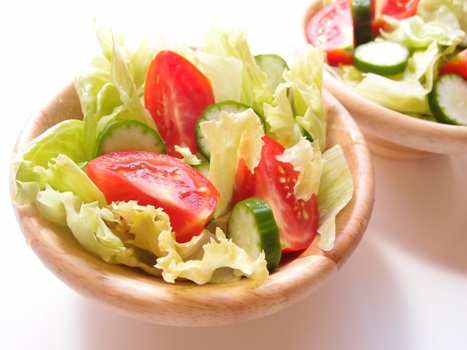
Myth 1 - Diet Control Alone Will Help You Lose Weight!
Before we get into the myths, let's get one thing right - these myths are not important in any given sequence. Meaning if you are thinking busting myth no.1 here is more important than say myth no.7, that's not how it works. You need to tighten up on all counts to start getting results! Also, lose weight or losing weight aren't the right phrase, losing fat or losing inches is what everyone should be after. So, if 16 weeks down the line, you still weigh the same but have lost 8% of body fat and 10 inches overall, you should be jumping up and down! However, for the sake of ease - since most of us are more familiar with the 'lose weight' terminology, I will sticking with it for the rest of the article. So, here goes... Let's have a look at DIET MYTH No.1 - DIET CONTROL ALONE WILL HELP YOU LOSE WEIGHT! How many times have we heard people talk about 'dieting' (as in skipping meals) or some fancy, new fad diet that they are going to try out. Chances are, numerous times. On the other hand, you'd rarely hear someone talk about some amazing new workout...
Before we get into the myths, let's get one thing right - these myths are not important in any given sequence. Meaning if you are thinking busting myth no.1 here is more important than say myth no.7, that's not how it works. You need to tighten up on all counts to start getting results! Also, lose weight or losing weight aren't the right phrase, losing fat or losing inches is what everyone should be after. So, if 16 weeks down the line, you still weigh the same but have lost 8% of body fat and 10 inches overall, you should be jumping up and down! However, for the sake of ease - since most of us are more familiar with the 'lose weight' terminology, I will sticking with it for the rest of the article. So, here goes... Let's have a look at DIET MYTH No.1 - DIET CONTROL ALONE WILL HELP YOU LOSE WEIGHT! How many times have we heard people talk about 'dieting' (as in skipping meals) or some fancy, new fad diet that they are going to try out. Chances are, numerous times. On the other hand, you'd rarely hear someone talk about some amazing new workout plan; except of course, if you are in a gym or in the vicinity of a CrossFit box. Popular fitness literature (not to mention, the internet) is overflowing with the notion that food is very important if you were to look lean and fit. However, the truth of the matter is - intensity of training matters more. So, if you are dreaming of looking amazing just by having an extreme control over your diet but have no plans of exercising, get ready to be disappointed! Fitness professionals - either due to lack of insight or just rank stupidity will tell you that 'the way you look is what you eat' or 'your body is sculpted in the kitchen'. Some even go to the extent of saying that 70% of diet and 30% exercise is responsible when it comes to looking the part! However, NOTHING CAN BE FURTHER FROM THE TRUTH! Diet does play a part but only when it comes to a photoshoot or a competition in a few weeks. However, please note here that those fitness models and athletes will have already had a great foundation laid (with intense training) and are looking to add that extra bit! If you are one of these people, then by all means, go on and skip the carbs or fat. But that is not for normal people looking to LOSE INCHES and to slip into a smaller dress size for their birthdays; SORRY! Picture this, a college athlete (never mind an elite athlete) is going to look in top shape. Do you even think for a moment that he or she'd be doing an ATKIN'S DIET or SKIPPING CARBS to get lean?! It's the intensity of training that's making these athletes look the way they do! So, if you feel you are going to be in the best shape of your life just by EATING CLEAN or SKIPPING MEALS ever so often, you CAN'T BE MORE WRONG! Of course, you might lose a few pounds (and a few inches) here and there. But it'd be nowhere as good as where you are likely to end up after a few months of intense exercise sessions complemented with a sound diet plan. In my book, diet just serves as the proverbial CHERRY on the training CAKE! Without the cake, that red cherry doesn't hold water... SIMPLE REALLY! TAKE HOME MESSAGE - Diet control, no matter how stringent, is half the work done. Use it as complementary to an effective and progressive exercise plan and you are likely to see better and quicker results
- Important notification about information and brand names used in this slideshow!
- Photo courtesy of kuwashima by sxc.hu : www.sxc.hu/photo/1400839
- www.sparkpeople.com/resource/nutrition_articles.asp?id=1372&page=4
- http://www.sparkpeople.com/resource/slideshow.asp?show=93
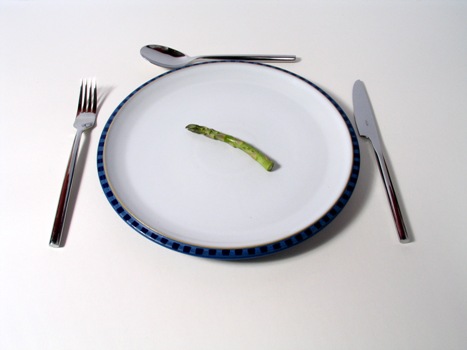
Myth 2 - Reducing Calories Alone Will Help You Lose Weight
Let's go back to the athletes again. How many calories, do you reckon, does a long distance runner consume on a daily basis? Since runners look skinny, you'd think not a lot, considering the way they look so skinny? On the contrary, most of them need to eat in excess of 3000 calories. Elite long-distance runners stacking-up anywhere between 125 - 135 miles a week burn about 3000-3500 calories a day (1). Thus, they have got to be eating in excess of that many calories. Part of the calories are burnt during training while part (equally crucial) go for rebuilding their bodies after those long runs. Ultra endurance athletes have been known to consume a WHOPPING 8000 CALORIES A DAY (2)! - mostly in the form of carbs! Similarly to distance runners, BODYBUILDERS needs large amounts of calories to keep repairing and building their muscles. SO, HOW MANY CALORIES WOULD YOU NEED? The number of calories that you need will largely depends on how intensely you are training. A WORD OF CAUTION HERE - if you aren't exercising at all and think that skipping calories will do the job, here's what will happen. It would make you lose a bit...
Let's go back to the athletes again. How many calories, do you reckon, does a long distance runner consume on a daily basis? Since runners look skinny, you'd think not a lot, considering the way they look so skinny? On the contrary, most of them need to eat in excess of 3000 calories. Elite long-distance runners stacking-up anywhere between 125 - 135 miles a week burn about 3000-3500 calories a day (1). Thus, they have got to be eating in excess of that many calories. Part of the calories are burnt during training while part (equally crucial) go for rebuilding their bodies after those long runs. Ultra endurance athletes have been known to consume a WHOPPING 8000 CALORIES A DAY (2)! - mostly in the form of carbs! Similarly to distance runners, BODYBUILDERS needs large amounts of calories to keep repairing and building their muscles. SO, HOW MANY CALORIES WOULD YOU NEED? The number of calories that you need will largely depends on how intensely you are training. A WORD OF CAUTION HERE - if you aren't exercising at all and think that skipping calories will do the job, here's what will happen. It would make you lose a bit of weight but the wrong kind of weight (muscles) and ti won't make you feel energetic, run faster, jump higher or lift heavier weights (you won't stand to gain much in terms of functional fitness or diseases prevention!). Again, calories that need to be consumed would also depend on your fitness goals. If you have some immediate goals to achieve - like lose a few inches for the Caribbean trip you've got planned in a few weeks, then by all means go low on calories. But you need to come back and start eating wholesome meals if you don't want to be sacrificing your health in favour of looking leaner! TAKE HOME MESSAGE - Reducing calories alone won't work; you've got to combine it with an effective exercise plan.
- Important notification about information and brand names used in this slideshow!
- Photo courtesy of ppreacher by sxc.hu : www.sxc.hu/photo/203247
- www.sparkpeople.com/resource/slideshow.asp?show=93
- (1) http://runnersconnect.net/running-nutrition-articles/what-does-the-diet-of-an-elite-marathon-runner-look-like/
- (2) http://www.nytimes.com/2010/05/13/sports/13runner.html?pagewanted=all&_r=0
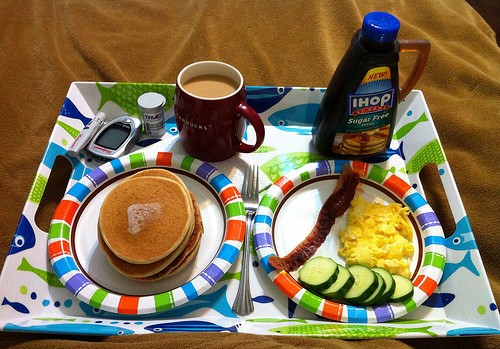
Myth 3 - Skip Meals And You Lose Weight Faster!
Alright, here goes MYTH No.3 - SKIP MEALS TO LOSE WEIGHT QUICKER! BRAD PILON is the guy who dug deep into research and came up with the EAT STOP EAT diet plan (1). Also known as intermittent fasting (IF) or alternate day fasting, Brad theory of losing weight by fasting alternate day is not new really. For years now, researchers have long been crying hoarse about the benefits of intermittent fasting and reduced meal frequency . But as is the case with almost everything, it takes years or decades for common knowledge amongst researchers to filter down to the common man! One of the studies that emphasizes the benefits of IF on human health was conducted by Matson and Wan and published in 2005 (2). This study and most others that look into IF have tended to focus on the benefits of reduced meal frequency on human health - mostly prevention of cardiovascular and other other metabolic diseases like diabetes mellitus. However, there is very little evidence to show that this method of skipping meals improves fitness parameters and in turn makes you look good. Furthermore, there is some amount of suspicion that alternate day fasting (as recommended by Brad)...
Alright, here goes MYTH No.3 - SKIP MEALS TO LOSE WEIGHT QUICKER! BRAD PILON is the guy who dug deep into research and came up with the EAT STOP EAT diet plan (1). Also known as intermittent fasting (IF) or alternate day fasting, Brad theory of losing weight by fasting alternate day is not new really. For years now, researchers have long been crying hoarse about the benefits of intermittent fasting and reduced meal frequency . But as is the case with almost everything, it takes years or decades for common knowledge amongst researchers to filter down to the common man! One of the studies that emphasizes the benefits of IF on human health was conducted by Matson and Wan and published in 2005 (2). This study and most others that look into IF have tended to focus on the benefits of reduced meal frequency on human health - mostly prevention of cardiovascular and other other metabolic diseases like diabetes mellitus. However, there is very little evidence to show that this method of skipping meals improves fitness parameters and in turn makes you look good. Furthermore, there is some amount of suspicion that alternate day fasting (as recommended by Brad), may in the long run, show results similar to those shown by reducing your daily intake of calories. Again, with intermittent fasting (as with reducing daily calories), diet control alone won't help! Exercising combined with a sound diet plan is always a better and quicker way to lose weight. TAKE HOME MESSAGE: Skipping meals is not the answer. To get better and quicker results, the level of your TRAINING INTENSITY, REDUCING DAILY CONSUMPTION OF CALORIES and EATING THE RIGHT FOODS holds the key!
- Important notification about information and brand names used in this slideshow!
- Photo courtesy of Lindsay Attaway by Flickr : www.flickr.com/photos/lindsayloveshermac/7615250254/
- (1) http://bradpilon.com/
- (2) Mattson, M. P. & Wan, R. (2005). Beneficial effects of intermittent fasting and caloric restriction on the cardiovascular and cerebrovascular systems. The Journal of Nutritional Biochemistry, 16, 129-137.
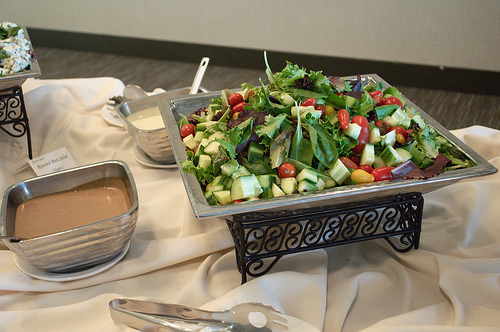
Myth 4 - Opt For Non-Fat Dressings, Always!
That NON-FAT SALAD DRESSINGS are a better choice is OLD NEWS! Lately, more and more nutritionists, not to mention researchers, are beginning to advocate salads with some amount of fat thrown in (obviously not a lot of saturated oil!) The logic is that fat is needed for absorption of essential ingredients in salads - especially carotenoids present in green, leafy veggies. Fat-dressing for salads, therefore, aren't that bad. However, it depends on the kind of fat used for the dressings as well. Most of the adverse-effects (cardiovascular disease and such) of fat dressings are due to the trans-fatty acid (TFA) and saturated fatty acid (SFA) content of the oil used (1). Oils containing monounsaturated fatty acids like olive oils, sunflower and safflower are way better options. What's more - since fats have a higher satiety value than proteins (you will feel fuller much quicker). Also, you're more likely to enjoy your meals compared to the bland non-fat dressings! TAKE HOME MESSAGE - Not all fats are harmful - using the right kinds of oils for dressings can be healthy, not to mention, lend a good taste and flavour to your salads.
- Important notification about information and brand names used in this slideshow!
- Photo courtesy of Derrick Coetzee by Flickr : www.flickr.com/photos/dcoetzee/5771422546/
- (1) Nazari B, Asgary S, Sarrafzadegan N. Warning about Fatty Acid Compositions in Some Iranian Mayonnaise Salad Dressings. Int J Prev Med 2010, 1(2):110-114.
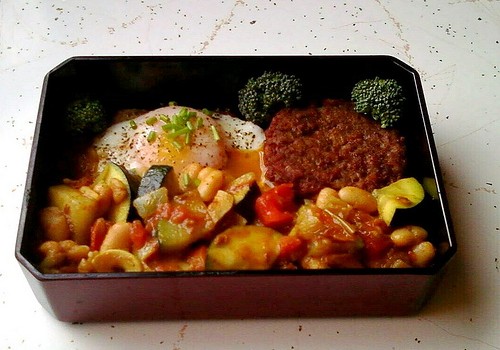
Myth 5 - Low-Fat Meals Won'T Taste Good!
Many a poor souls have had to suffer from chronic diseases and live miserable lives because of this myth. In fact, millions still do. If only we were taught to appreciate the real taste or flavour of foods without masking it by using fats or sugars! The truth of the matter is that LOW-FAT FOOD DOESN'T TASTE BAD AT ALL!. All you've got to do is hang in there for a few weeks and you get used to it. While those of you who've never tried to have a bowl of oats porridge first thing in the morning, you would think it's not such a great idea. However, ask someone who's been doing it for months and pat comes the answer - oh! I love it! What's more, there are always ways you can make meals taste good without the use of too much oil (or sugar). Let's go back to the oats porridge - get oats in a bowl, pour some low-fat milk in it, put it through the microwave. After about a minute or two of cooling, add your favourite whey protein powder on top of it (I kind of like the vanilla flavour!). Not only will your...
Many a poor souls have had to suffer from chronic diseases and live miserable lives because of this myth. In fact, millions still do. If only we were taught to appreciate the real taste or flavour of foods without masking it by using fats or sugars! The truth of the matter is that LOW-FAT FOOD DOESN'T TASTE BAD AT ALL!. All you've got to do is hang in there for a few weeks and you get used to it. While those of you who've never tried to have a bowl of oats porridge first thing in the morning, you would think it's not such a great idea. However, ask someone who's been doing it for months and pat comes the answer - oh! I love it! What's more, there are always ways you can make meals taste good without the use of too much oil (or sugar). Let's go back to the oats porridge - get oats in a bowl, pour some low-fat milk in it, put it through the microwave. After about a minute or two of cooling, add your favourite whey protein powder on top of it (I kind of like the vanilla flavour!). Not only will your breakfast be better tasting but it will be packed with proteins (not to mention the fiber from oats), Likewise, by using a bit of imagination, you can make almost anything taste good. BBCGoodFood.com has some good low-fat recipes up their sleeve - you might as well try them out. TAKE HOME MESSAGE - ALL FOODS have their own inherent tastes and flavours - learn to appreciate the flavours and in due course of time, you will more likely than not - dread when adding salt, fats or sugar to your meals!
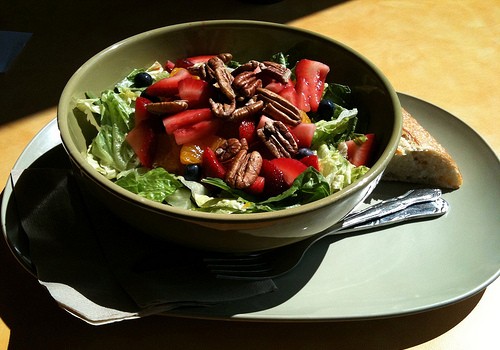
Myth 6 - Eat Fat-Free Food, Always!
No fat in your food and you won't have any to store in your body - sound fairly simple, doesn't it! However, that's not the way it works! Human obesity occurs not due to presence of fat in the diet - there is overwhelming evidence to suggest that consumption of disproportionately large amount of calories is making us fat (1-5) . Highly processed foods containing sugars, the wrong kind of fats (more of this later), salt and flavour enhancers are more to blame than fat per say. Also, excess calories end up as body fat because not too many of us indulge in physically demanding tasks (6). So, if you are thinking, I am going to cut down all the fat from my food and I'll be fine, you are heading for trouble! Another reason for eating some amount of fat is that fat is indispensable for sustaining human life. Fat serves numerous physiological functions in our bodies - from being an important source of energy to maintaining healthy tissues - brain and nerves, hair, skin and nails. Additionally, absorption of fat-soluble vitamins - A, D, E and K will depend on the presence of fat in diet. Too much...
No fat in your food and you won't have any to store in your body - sound fairly simple, doesn't it! However, that's not the way it works! Human obesity occurs not due to presence of fat in the diet - there is overwhelming evidence to suggest that consumption of disproportionately large amount of calories is making us fat (1-5) . Highly processed foods containing sugars, the wrong kind of fats (more of this later), salt and flavour enhancers are more to blame than fat per say. Also, excess calories end up as body fat because not too many of us indulge in physically demanding tasks (6). So, if you are thinking, I am going to cut down all the fat from my food and I'll be fine, you are heading for trouble! Another reason for eating some amount of fat is that fat is indispensable for sustaining human life. Fat serves numerous physiological functions in our bodies - from being an important source of energy to maintaining healthy tissues - brain and nerves, hair, skin and nails. Additionally, absorption of fat-soluble vitamins - A, D, E and K will depend on the presence of fat in diet. Too much of low-fat diet over long periods of time will lead to deficiencies of these vitamins. Furthermore, fat is also crucial for hormone synthesis. Cholesterol (a kind of fat) is the starting material for synthesis of steroid hormones (steroidogenesis) . Thus, if your diet is too low in fat, steroidogenesis can get seriously affected with devastating consequences on your health. So, WHAT'S THE RIGHT WAY to go about things? Since cutting out all the fat isn't the way to go, here's what you need to do - get to know which fats are good and which ones bad for you. Saturated fats - usually of non-vegetarian sources - are bad; eating lean meat can solve the problem. Similarly, trans-fatty acids - found in fast foods and fried foods aren't good for us. Replace saturated and trans fats with monounsaturated fats (like Olive oil, sunflower oil, avocados) and polyunsaturated fatty acids (PUFAs) like plant oils and fish oils. PUFAs are rich in omega-3 and omega-6 (the essential) fatty acids - besides serving other functions, essential fatty acids are good for our cartilage and joints as well. TAKE HOME MESSAGE - Fats are an essential component of your food. Low-fat diets can lead to deficiency of fat-soluble vitamins and essential fatty acids. This in turn can cause a plethora of symptoms. Rather than cutting out all fat, replacing bad fat with good fat makes more sense.
- Important notification about information and brand names used in this slideshow!
- Photo courtesy of Sean by Flickr : www.flickr.com/photos/22280677@N07/6023166520/
- (1) Swinburn BA, Sacks G, Hall KD, McPherson K, Finegood DT, Moodie ML et al. The global obesity pandemic: shaped by global drivers and local environments. Lancet 2011, 378(9793):804-814
- (2) McCrory MA, Suen VM, Roberts SB. Biobehavioral influences on energy intake and adult weight gain. J Nutr 2002, 132(12):3830S-3834S
- (3) Prentice A, Jebb S. Energy intake/physical activity interactions in the homeostasis of body weight regulation. Nutr Rev 2004, 62(7 Pt 2):S98-104
- (4) Hall KD, Guo J, Dore M, Chow CC. The progressive increase of food waste in America and its environmental impact. PLoS One 2009, 4(11):e7940
- (5) Bleich S, Cutler D, Murray C, Adams A. Why is the developed world obese? Annu Rev Public Health 2008, 29:273-295
- (6) Gortmaker SL, Swinburn BA, Levy D, Carter R, Mabry PL, Finegood DT et al. Changing the future of obesity: science, policy, and action. Lancet 2011, 378(9793):838-847.
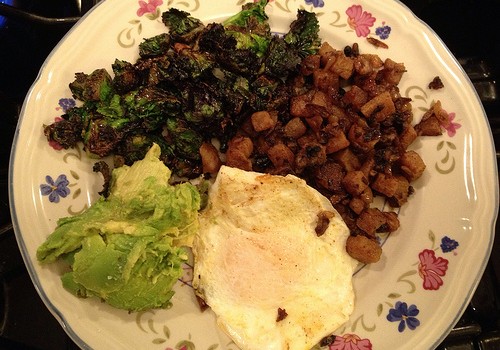
Myth 7 - Low-Carb Food Is The Key To Losing Weight
Most modern so-called 'weight-loss' diets stress upon the importance of low-carb food. The theory behind it is that excess carbs - over and above that needed to fuel your energy needs - will get stored as body fat. Why do these diets say so? Well, because they base their theories on the erroneous hypothesis which was suggested by Jean Mayer almost 60 years ago - that low blood sugar levels stimulated hunger (1). According to the theory consumption of carbs leads to sudden increase in insulin which causes sharp decrease in blood sugar levels. Reduced sugar levels again induce eating. This lead to continued eating beyond what is required. Subsequent research has, however, tended to refute this theory (2). Sadly, Mayer's hypothesis - although proven to be false - has stuck with us. Increased insulin secretion is also (erroneously, again) thought to cause excess carbs to be deposited as fats into fat cells. The truth of the matter is that increased total energy intake rather than carbs alone is responsible for most cases of obesity. Guyenet and Schwartz, in their study published in 2011, have identified the role of total calorie intake rather than carbs alone as being responsible for...
Most modern so-called 'weight-loss' diets stress upon the importance of low-carb food. The theory behind it is that excess carbs - over and above that needed to fuel your energy needs - will get stored as body fat. Why do these diets say so? Well, because they base their theories on the erroneous hypothesis which was suggested by Jean Mayer almost 60 years ago - that low blood sugar levels stimulated hunger (1). According to the theory consumption of carbs leads to sudden increase in insulin which causes sharp decrease in blood sugar levels. Reduced sugar levels again induce eating. This lead to continued eating beyond what is required. Subsequent research has, however, tended to refute this theory (2). Sadly, Mayer's hypothesis - although proven to be false - has stuck with us. Increased insulin secretion is also (erroneously, again) thought to cause excess carbs to be deposited as fats into fat cells. The truth of the matter is that increased total energy intake rather than carbs alone is responsible for most cases of obesity. Guyenet and Schwartz, in their study published in 2011, have identified the role of total calorie intake rather than carbs alone as being responsible for obesity (3) Although some scientific evidence does suggest that low-carb meals may cause modest long-term weight loss (4) these low-carb meals aren't any better than high-carb diets, for instance the Mediterranean diet. WHEW! Too much of science there... Well, in a nutshell, scientific evidence suggests that it doesn't really matter what you eat - to lose weight, cutting down on calories is more crucial. Having said that, you don't need to go raving mad and count every single calorie that you consume - keep the portion size down and you should be OK! HOWEVER, if you are an athlete, macronutrient content (% of protein, carbs or fat) of your food does make a difference. For instance, endurance athlete typically take in carbs and proteins in a ratio of 4:1 while bodybuilder would go low on carbs and crank up on the proteins, especially during ripping phase. So, if you are a sports person looking to bump up your performance, calories as well as where the calories are coming from (proteins and carbs or fats) will make a world of difference. If you are just looking to get leaner, cutting down on calories - in combination with a well thought out exercise program - should do the trick for you. TAKE HOME MESSAGE - Avoiding carbs isn't the answer. Cutting down on overall calories combined with an effective exercise plan will work wonders for you.
- Important notification about information and brand names used in this slideshow!
- Photo courtesy of kirybabe by Flickr : www.flickr.com/photos/kiry/8642092129/
- (1) Mayer J. Glucostatic mechanism of regulation of food intake. 1953. Obes Res 1996, 4(5):493-496
- (2) Grossman SP. The role of glucose, insulin and glucagon in the regulation of food intake and body weight. Neurosci Biobehav Rev 1986, 10(3):295-315
- (3) Guyenet SJ, Schwartz MW. Clinical review: Regulation of food intake, energy balance, and body fat mass: implications for the pathogenesis and treatment of obesity. J Clin Endocrinol Metab 2012, 97(3):745-755
- (4) Shai I, Schwarzfuchs D, Henkin Y, Shahar DR, Witkow S, Greenberg I et al. Weight loss with a low-carbohydrate, Mediterranean, or low-fat diet. N Engl J Med 2008, 359(3):229-241.

Myth 8 - Baking And Steaming Are The Only Choices You'Ve Got!
If you are thinking that BAKING and STEAMING are the only choices you've got to cook food, you can't be more wrong. ROASTING is an all time favourite, esp. when it comes to meat-eaters. Not only does it drip off almost all the fat, it also adds flavour to the meat. Poultry, seafood and meat can be cooked using this method. A downside - you'd need to preheat the oven - can sometimes be time-consuming. BRAISING is quite a good way of cooking healthy foods - this involves browning your food (ever so slightly) in a non-stick pan and then cooking it gradually with water or broth. SAUTEING or STIR-FRYING: I like these much better than the roasting method; I don't need to wait too long! However, with this method, you'd only be able to cook smaller chunks of food. A big plus with sauteing or stir-frying is that you can cook your food using just a dash of oil (I use extra virgin olive oil) or a cooking spray. There are people who like using water instead of oil - try it, if that works well for you, well and good - not my cup of tea though! Remember...
If you are thinking that BAKING and STEAMING are the only choices you've got to cook food, you can't be more wrong. ROASTING is an all time favourite, esp. when it comes to meat-eaters. Not only does it drip off almost all the fat, it also adds flavour to the meat. Poultry, seafood and meat can be cooked using this method. A downside - you'd need to preheat the oven - can sometimes be time-consuming. BRAISING is quite a good way of cooking healthy foods - this involves browning your food (ever so slightly) in a non-stick pan and then cooking it gradually with water or broth. SAUTEING or STIR-FRYING: I like these much better than the roasting method; I don't need to wait too long! However, with this method, you'd only be able to cook smaller chunks of food. A big plus with sauteing or stir-frying is that you can cook your food using just a dash of oil (I use extra virgin olive oil) or a cooking spray. There are people who like using water instead of oil - try it, if that works well for you, well and good - not my cup of tea though! Remember - at the end of the day, if you are serious enough in your endeavours to lose weight, you'd have to get busy in the kitchen as well (just the gym won't do!).! Learning new recipes (low-fat, free of sugar and what-have-you) and cooking healthy is what you will come to enjoy - especially once you start noticing the difference in you! TAKE HOME MESSAGE - Baking and steaming aren't the only way to cook food. Sauteing, stir-frying or roasting are equally, if not more, effective!
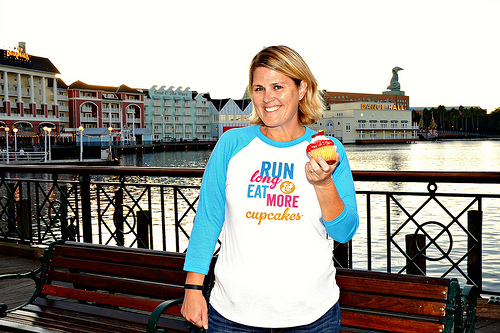
Myth 9 - To Lose Weight, You Have Got To Burn Every Calorie That You Consume!
A lot many times, you will be handed down a simple logic - IF CALORIES TAKEN IN ARE LESSER THAN CALORIES BURNT - YOU WILL STAND TO LOSE WEIGHT. Well, truth of the matter is, IT AIN'T THAT SIMPLE! You weight problem - whether being slightly overweight or downright obese - is a measure of many complex mechanisms - including genetic tendency, neurogenic control of hunger (or satiety) and role of hormones like insulin, ghrelin and leptin (1). Insulin and leptin resistance are now being recognized as big factors in causing obesity. Lately, the role of white adipose tissue (WAT) in controlling energy expenditure and food behaviour is also being recognised (2). Furthermore, a chronic, low-grade inflammatory state is now looked upon as another contributor to obesity (3). In a nutshell, while excess calories may cause obesity, it is not the only mechanism responsible. Also, there's another BIG REASON WHY YOU CAN'T BE BURNING EVERY CALORIE you consume. Part of the calories you eat are needed to fuel organ systems in your body. As you may well be aware, cells of most of these systems are constantly being replenished - blood cells, bone cells, cells of the gastrointestinal and respiratory...
A lot many times, you will be handed down a simple logic - IF CALORIES TAKEN IN ARE LESSER THAN CALORIES BURNT - YOU WILL STAND TO LOSE WEIGHT. Well, truth of the matter is, IT AIN'T THAT SIMPLE! You weight problem - whether being slightly overweight or downright obese - is a measure of many complex mechanisms - including genetic tendency, neurogenic control of hunger (or satiety) and role of hormones like insulin, ghrelin and leptin (1). Insulin and leptin resistance are now being recognized as big factors in causing obesity. Lately, the role of white adipose tissue (WAT) in controlling energy expenditure and food behaviour is also being recognised (2). Furthermore, a chronic, low-grade inflammatory state is now looked upon as another contributor to obesity (3). In a nutshell, while excess calories may cause obesity, it is not the only mechanism responsible. Also, there's another BIG REASON WHY YOU CAN'T BE BURNING EVERY CALORIE you consume. Part of the calories you eat are needed to fuel organ systems in your body. As you may well be aware, cells of most of these systems are constantly being replenished - blood cells, bone cells, cells of the gastrointestinal and respiratory tract. This replenishing of cells - not to mention normal physiological processes like respiration, blood circulation and others require energy. So, if you were to compromise too much on calories by way of starving or skipping meals or trying to burn more calories than you consume, you won't have very many calories left for these rebuilding processes - not to mention, for rebuilding your muscles and immune systems from the stress of exercising. Therefore you are likely to see adverse effects. TAKE HOME MESSAGE: You need calories for regeneration of tissues in your body. The more you stimulate your metabolic rate - by way of exercise - the more your calorie needs would be. You DO NOT HAVE TO BURN every single calorie that you consume. If you have loads of energy and mental focus when you workout and are seeing results - in terms of pounds or inches lost - you really shouldn't be worried too much about how many calories you burn during an exercise session.
- Important notification about information and brand names used in this slideshow!
- Photo courtesy of AngryJulieMonday by Flickr : www.flickr.com/photos/angryjuliemonday/8184457182/
- (1) Guyenet SJ, Schwartz MW. Clinical review: Regulation of food intake, energy balance, and body fat mass: implications for the pathogenesis and treatment of obesity. J Clin Endocrinol Metab 2012, 97(3):745-755
- (2) Belkina AC, Denis GV. Obesity genes and insulin resistance. Curr Opin Endocrinol Diabetes Obes 2010, 17(5):472-477
- (3) Bastard JP, Maachi M, Lagathu C, Kim MJ, Caron M, Vidal H et al. Recent advances in the relationship between obesity, inflammation, and insulin resistance. Eur Cytokine Netw 2006, 17(1):4-12.
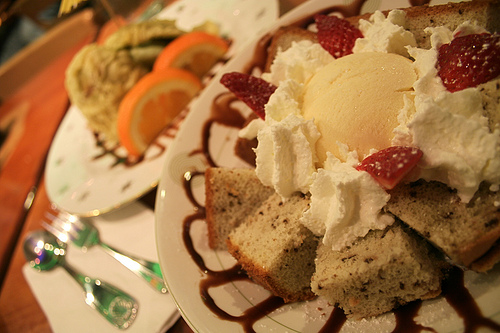
Myth 10 - Desserts Are A Strict No-No
Let's face it - we are human beings. Not that that is bad but what I mean is that we all have our weakness. And, when it comes to food, it goes without saying that most us have a sweet tooth for something or the other. But DO YOU REALLY HAVE TO STOP EATING YOUR FAVOURITE DESSERT if you are looking to lose inches? Well, I for one, certainly don't think so! The best thing to do is cut down on the frequency - in fact, you could use that weakness and turn it into a strength. This is how you do it. 1. Promise yourself, you'll have a bar of your favourite chocolate every time you lose a couple of inches over your tummy. 2. Have it on a weekend, especially if you've been doing some strict work with your diet and exercise - they tend to call these the CHEAT DAYS in fitness circles. However, rather than cheat days - where you are allowed to eat anything the whole day - I'd suggest, you use that day to reward yourself with a little of what you like the most. 3. Keep the portion size down and you should...
Let's face it - we are human beings. Not that that is bad but what I mean is that we all have our weakness. And, when it comes to food, it goes without saying that most us have a sweet tooth for something or the other. But DO YOU REALLY HAVE TO STOP EATING YOUR FAVOURITE DESSERT if you are looking to lose inches? Well, I for one, certainly don't think so! The best thing to do is cut down on the frequency - in fact, you could use that weakness and turn it into a strength. This is how you do it. 1. Promise yourself, you'll have a bar of your favourite chocolate every time you lose a couple of inches over your tummy. 2. Have it on a weekend, especially if you've been doing some strict work with your diet and exercise - they tend to call these the CHEAT DAYS in fitness circles. However, rather than cheat days - where you are allowed to eat anything the whole day - I'd suggest, you use that day to reward yourself with a little of what you like the most. 3. Keep the portion size down and you should be fine with whatever desserts you have; a word of caution though - if that desire for desserts is happening ever so often, it can jeopardise your plans of losing weight! Also, contrary to what most people think, DESSERTS NEED NOT BE UNHEALTHY AT ALL..Keep the sugar and saturated fat down and you should be fine. Also, there are ways in which you can still make these low-fat, sugarless desserts taste good - Fudgy Cream Cheese Brownies from Health.com are a brilliant example (1). To sum it all up, desserts are fine provided you have them once in a while and the portion isn't something that will bring your world crashing down! Also, there are numerous recipes for desserts that taste great despite being low in sugar and fat! TAKE HOME MESSAGE - Occasional deserts are a good way of rewarding yourself from time to time. Also, desserts need not be unhealthy at all!
- Important notification about information and brand names used in this slideshow!
- Photo courtesy of jessicahtam by Flickr : www.flickr.com/photos/jessicatam/4401426731/
- (1) http://www.health.com/health/recipe/0,,10000001733006,00.html










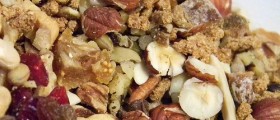

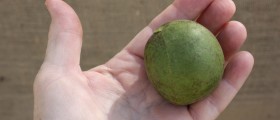




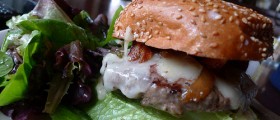
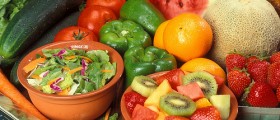

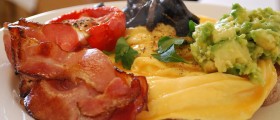

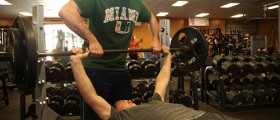


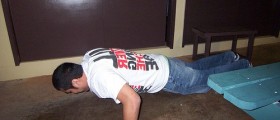
Your thoughts on this
Loading...